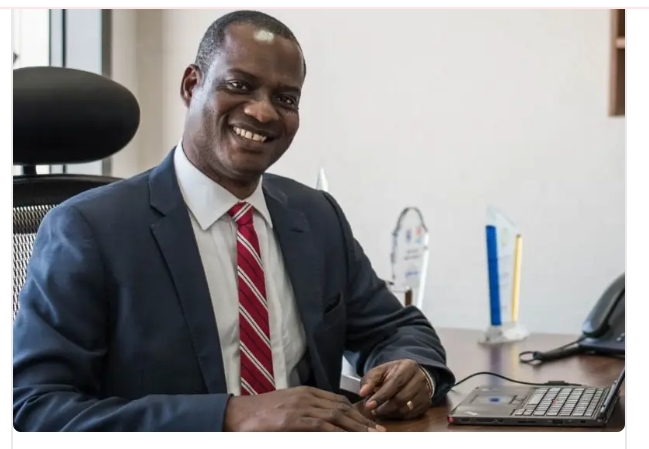brand
Update : 2024 Economic Outlook : FG will be able to save N8tn annually from the fuel subsidy removal and unify exchange rate policies, Says Oyedele

 The Chairman of the Presidential Fiscal Policy and Tax Reforms Committee, Taiwo Oyedele, has said the Federal Government will be saving N8tn annually from the fuel subsidy removal and exchange rate unification policies.
The Chairman of the Presidential Fiscal Policy and Tax Reforms Committee, Taiwo Oyedele, has said the Federal Government will be saving N8tn annually from the fuel subsidy removal and exchange rate unification policies.
Oyedele spoke during a panel session at the Lagos Chamber of Commerce and Industry 2024 Economic Outlook and Budget Analysis.
He, therefore, said it was critical for the government to spend the amount saved from the two policies to ameliorate the suffering of the average Nigerian.
He said, “The Nigerian people made sacrifices as a result of the fuel subsidy removal of the government; that is N4tn savings a year. We did naira floatation. It is not perfect. We are also saving another N4tn. So we are having about roughly N8tn transferred from the private pockets of the people to the government.
“So, what we are saying to the government is — can we be intentional in spending this N8tn to make sure that it impacts the people most positively? Starting with the multidimensional poverty. why is it that more than 133 million people in Nigeria are living in multidimensional poverty? So these are the conversations we are having now. We want to build a platform where we can track how these monies are being spent.”
He added, “In the committee, we tried to look at the most pressing issues we face as a country — inflation, forex instability, lack of investments. One of our recommendations is for the government to suspend some taxes. We call them nuisance taxes because they frustrate people, and we can’t even see the money in government treasury.”
According to Oyedele, there is an urgent need to create digital opportunities for the teeming youthful population because Nigeria has enough capacity to generate $20bn annually from the technology sector.
Hinting on some of the recommendations the panel has made to the Federal Government, Oyedele said there was an urgent need to promote exports, including services and intellectual property because, “Before you start exporting goods, you can export services and intangibles.”
He also said that out of the $20bn diaspora remittances recorded in 2023, more than 90 per cent of the funds did not arrive Nigeria in foreign currencies because of existing loopholes which allow middlemen to divert the foreign currencies and pay the recipients of the funds in naira.
He added. “For example, just asking Nigerian companies and businesses to pay taxes in dollars is about $3.5bn annually, but we sat and thought about it, and wondered how the idea came about.
“How does it help us, that a Nigerian company will go to the market to go and look for the little dollars that is in Nigeria so it can use it to pay the government of Nigeria? So, just amend the law and you will take that pressure away.”
Also speaking, the Director General of the Budget Office, Ben Akabueze, expressed concern that the country’s penchant for operating budgets with room for deficit in the past three decades had left a debt profile that has raised concern.
Akabueze said, “In our current circumstance, we believe that our biggest fiscal challenge is raising public revenues. That is, the low public revenues against the background of the ever-increasing demand for public goods and services.
“For over two decades, we have been running deficit in our budget. These deficits have accumulated. They have been funded through debt consistently. The truth is that we haven’t paid back the debt. Now we are at a point where there are concerns about our debt. So we can’t continue with the deficit. The deficit for the 2024 budget is about 3.8 per cent of our GDP.”
Speaking further, Akabueze dismissed criticisms surrounding inordinate expenditure on the part of the government.
He noted that Nigeria was not spending enough and that emphasis should be placed on effective spending and not less spending.
He added, “Sometimes people ask — why don’t you cut expenditure? That’s not a feasible option. In the first place, we are not spending enough. If you look at our public expenditure to GDP ratio, it is below what it should be. So, spending less is not an option for us. Spending more efficiently — yes.”
On his part, the Chief Executive Officer of Financial Derivatives, Bismarck Rewane, said key economic challenges have continued to plague the Nigerian economy.
These challenges, according to him, include sub-optimal and non-inclusive growth, increasing income inequality, high poverty and unemployment rate, spiraling inflation, widening fiscal imbalances, and currency pressures.
He also noted that Nigeria’s inflation maintains its upward trend, largely driven by monetary and cost-push factors.
He said external debt service to export ratio shows the external sector is vulnerable.
Rewane also blamed lack of transparency and clear policy direction, lack of effective price discovery measure, capital controls and inefficiency, and high speculation/ arbitrage activities have been for the protracted forex crisis in the country.
brand
Body of Bank CEOs Delivers Critical Relief to Flood Victims in Niger State, Pledges Continued Support

 Pix 1 L-R: Registrar & Chief Executive of the Chartered Institute of Bankers of Nigeria (CIBN) Akin Morakinyo; Managing Director and Chief Executive Officer of Keystone Bank Limited, Mr. Hassan Imam; Group Managing Director/Chief Executive, Zenith Bank, Dame (Dr.) Adaora Umeoji; The Executive Governor of Niger State, His Excellency, Governor Mohammed Umaru Bago; Chairman, Body of Bank CEOs and Group Managing Director/CEO, United Bank for Africa (UBA) Plc, Oliver Alawuba; Managing Director Taj Bank Mr. Hamid Joda; and Secretary to the Government of Niger State (SSG), Alhaji Abubakar Usman during the donation of relief materials from the Body of Bank CEOs in Nigeria, aimed at supporting victims of the recent devastating floods in Mokwa Local Government Area held at the Niger State House in Abuja at the weekend.
Pix 1 L-R: Registrar & Chief Executive of the Chartered Institute of Bankers of Nigeria (CIBN) Akin Morakinyo; Managing Director and Chief Executive Officer of Keystone Bank Limited, Mr. Hassan Imam; Group Managing Director/Chief Executive, Zenith Bank, Dame (Dr.) Adaora Umeoji; The Executive Governor of Niger State, His Excellency, Governor Mohammed Umaru Bago; Chairman, Body of Bank CEOs and Group Managing Director/CEO, United Bank for Africa (UBA) Plc, Oliver Alawuba; Managing Director Taj Bank Mr. Hamid Joda; and Secretary to the Government of Niger State (SSG), Alhaji Abubakar Usman during the donation of relief materials from the Body of Bank CEOs in Nigeria, aimed at supporting victims of the recent devastating floods in Mokwa Local Government Area held at the Niger State House in Abuja at the weekend.
 The Executive Governor of Niger State, His Excellency, Governor Mohammed Umaru Bago; Chairman, Body of Bank CEOs and Group Managing Director/CEO, United Bank for Africa (UBA) Plc, Oliver Alawuba during the donation of relief materials from the Body of Bank CEOs in Nigeria, aimed at supporting victims of the recent devastating floods in Mokwa Local Government Area held at the Niger State House in Abuja at the weekend
The Executive Governor of Niger State, His Excellency, Governor Mohammed Umaru Bago; Chairman, Body of Bank CEOs and Group Managing Director/CEO, United Bank for Africa (UBA) Plc, Oliver Alawuba during the donation of relief materials from the Body of Bank CEOs in Nigeria, aimed at supporting victims of the recent devastating floods in Mokwa Local Government Area held at the Niger State House in Abuja at the weekend
Pix 3: L-R: Managing Director and Chief Executive Officer of Keystone Bank Limited, Mr. Hassan Imam; Group Managing Director/Chief Executive, Zenith Bank, Dame (Dr.) Adaora Umeoji; The Executive Governor of Niger State, His Excellency, Governor Mohammed Umaru Bago; Chairman, Body of Bank CEOs and Group Managing Director/CEO, United Bank for Africa (UBA) Plc, Oliver Alawuba; and Managing Director Taj Bank Mr. Hamid Joda, during the donation of relief materials from the Body of Bank CEOs in Nigeria, aimed at supporting victims of the recent devastating floods in Mokwa Local Government Area held at the Niger State House in Abuja at the weekend.
In a heartwarming display of corporate social responsibility and solidarity, a consortium of Nigerian Bank CEOs, has pledged significant support to alleviate the suffering of flood victims in Niger State
The Executive Governor of Niger State, His Excellency, Governor Mohammed Umaru Bago on Saturday in Abuja received relief materials from the Body of Bank CEOs led by its Chairman, Mr Oliver Alawuba.
The gesture is aimed at supporting victims of the recent devastating floods in Mokwa Local Government Area of the state.
Oliver Alawuba who is also the Group Managing Director/CEO of United Bank for Africa(UBA), led the delegation to the Niger State Government house Abuja, where they presented essential relief items, including bags of rice, beverages, vegetable oil, and mattresses, valued at millions of naira.
The devastating floods, which have affected thousands of families in the region, have prompted the banking community to come together in a show of empathy and support to those displaced and affected by the disaster.
In his address, Alawuba expressed the banking industry’s deep sympathy for the affected communities and reaffirmed their dedication to sustainable support while pointing out that the gesture underscores the banking sector’s commitment to corporate social responsibility and humanitarian intervention especially in times of crisis.
He said, “Today, we stand with the people of Niger State in their time of need. We want you to know that we feel your pain and we give you our firm resolve to assist in rebuilding lives. This donation is just the beginning; we pledge continued collaboration with the Niger State Government to ensure long-term recovery and resilience.”
Other top CEOs and executives at the presentation included by the Group Managing Director/Chief Executive of Zenith Bank, Dame (Dr.) Adaora Umeoji, the Registrar and Chief Executive of the Chartered Institute of Bankers of Nigeria (CIBN), Mr. Akin Morakinyo, Managing Director and Chief Executive Officer of Keystone Bank Limited, Mr. Hassan Imam; Managing Director Taj Bank Mr. Hamid Joda; Secretary to the Government of Niger State (SSG), Alhaji Abubakar Usman senior government officials, banking executives, and media representatives, marking a significant step in public-private collaboration for humanitarian relief.
Governor Bago, who received the relief materials on behalf of the state, commending the banking sector for its timely intervention.
“This gesture reinforces the critical role of private-sector partnerships in disaster response,” Governor Bago stated. “We are grateful for this support and look forward to deeper collaboration in safeguarding our communities against future challenges. On behalf of the good people of Niger State, particularly the affected families in Mokwa, I extend our sincerest thanks for this timely and compassionate intervention,” Bago stated.
“The recent floods in the state brought immense hardship to the people, displacing families, destroying livelihoods, and disrupting communities and the banking sector, under the leadership of Alawuba and his esteemed colleagues, has demonstrated that beyond financial stewardship, they are true partners in national development and humanitarian service.
This donation is not just about the physical items; it is a symbol of hope, resilience, and the unwavering support of Nigeria’s financial institutions in times of need. It reassures our people that they are not forgotten, the governor stated.
…
brand
FirstBank Wins Gold for Best Corporate University in Social & Climate Change Impact

 FirstBank, the West Africa premier bank and financial inclusion services provider, is thrilled to announce that its Corporate University, FirstAcademy, has been awarded the Gold Award for Best Corporate University in Social & Climate Change at the Global Council of Corporate Universities (GlobalCCU) Awards 2025.
FirstBank, the West Africa premier bank and financial inclusion services provider, is thrilled to announce that its Corporate University, FirstAcademy, has been awarded the Gold Award for Best Corporate University in Social & Climate Change at the Global Council of Corporate Universities (GlobalCCU) Awards 2025.
This highly acclaimed award recognises FirstAcademy’s outstanding commitment to driving social and climate change learning initiatives, aligning its learning and development programs with internal stakeholder needs, and promoting Corporate Social Responsibility (CSR).
The GlobalCCU Awards is a prestigious, biannual recognition of excellence in corporate universities, setting the highest standard for the industry. With a rich 12-year history dating back to its inaugural ceremony in Paris in 2013, the awards have consistently honoured outstanding Corporate Universities, learning and development structures worldwide. The GlobalCCU Awards celebrate institutions that create remarkable value for people, businesses, society and the planet.
FirstBank’s FirstAcademy exemplifies this mission by earning the Gold Award for Best Corporate University in Social & Climate Change at the 2025 ceremony in Paris, France. This distinction reflects FirstAcademy’s dedication to fostering sustainability and environmental responsibility; developing impactful learning initiatives that transcends traditional corporate training, with broader societal goals; integrating climate action into its portfolio and operations; expanding climate finance offerings and developing a climate action capacity building training program.
FirstAcademy was inaugurated in 2012 as the Bank’s designated corporate academy designed to provide structured talent development, knowledge management and culture change initiatives. One major objective of the academy is to equip staff with the requisite knowledge and skills required to deliver on the Bank’s strategic aspirations and to thrive in an ever-evolving work environment while contributing to social and environmental responsibility.
According to the Founder and Chairman of the GlobalCCU Awards, Annick Renaud-Coulon, “FirstAcademy is an outstanding Corporate University that is clearly the Best Corporate University globally for driving social and climate change learning initiatives.”
Congratulating FirstAcademy, the Founder and Chairman of the GlobalCCU Awards, Annick Renaud-Coulon, said “FirstAcademy is a very mature Corporate University which demonstrates a strong alignment with FirstBank’s vision of responsible banking and sustainable development, with clear support from senior leadership and a governance model that strategically connects learning to business priorities. Congratulations to FirstAcademy for setting a visionary standard in advancing meaningful social and climate change impact through learning and inclusive capacity building!”
In the words of Olayinka Ijabiyi, the Acting Group Head, Marketing and Corporate Communications, FirstBank “We are delighted to receive this international recognition for our efforts in promoting social responsibility and climate action. This award serves as a testament to our belief that businesses can be a force for good, driving transformation that extends beyond profit to create sustainable and equitable futures for all. FirstAcademy’s programs have not only enhanced employee skills but also contributed to the well-being of society and the environment.”
As FirstBank’s FirstAcademy continues to bridge the gap between corporate initiatives and community needs, it sets a leading example for corporate universities around the globe, inspiring others to follow suit in the quest for meaningful change.
brand
Access Holdings Topsin Asset Qualityin Proshare’s 2025Tier1 Banking Rankings


Access Holdings PLC has been ranked the Tier 1 bank
-
www.accessbankplc.comAccessHoldingsdemonstratedstrongfundamentalsacrossalltheseparameters.Itclosed Full Year 2024 with total assets of 41.5 trillion and a loan book of 13.1 trillion.₦ ₦The Group’scapitaladequacyratiostoodat20.46percent,whileassetgrowthfortheperiodreached55.49percent.Itscostofriskwasheldat1.25percent,netinterestmargin recorded at 6.80 percent, and earnings growth was an impressive 88.05 percent,all indicators of a business built on financial soundness and execution excellence.Speaking at the launch event, Olufemi Awoyemi, Chairman of Proshare, described thereport as a vital mirror into the shifting dynamics of Nigeria’s financial services industry.“AccessHoldingshasprovenitselfasastrong,adaptiveinstitution.Itsrobustcapitalbase, successful fundraising, and continental expansion efforts show a group that is notonlygrowingbutevolving.Asrecapitalisationreshapesthebankinglandscape,institutions like Access Holdings will continue to define the future of finance in Africa.”He further remarked on the nuance behind E
-

 news5 years ago
news5 years agoUPDATE: #ENDSARS: CCTV footage of Lekki shootings intact – Says Sanwo – Olu
-

 news2 years ago
news2 years agoEnvironmental Pollutions : OGONI COMMUNITY CRIES OUT, THREATENS TO SHUT DOWN FIRSTBANK,SHELL OIL COMPANY OPERATIONS FOR NOT PAYING COURT AWARD
-

 lifestyle5 years ago
lifestyle5 years agoFormer Miss World: Mixed reactions trail Agbani Darego’s looks
-

 health4 years ago
health4 years agoChairman Agege LG, Ganiyu Egunjobi Receives Covid-19 Vaccines
-

 politics2 months ago
politics2 months agoBreaking : Oborevwori , Okowa others dumps PDP, defects to APC
-

 lifestyle4 years ago
lifestyle4 years agoObateru: Celebrating a Quintessential PR Man at 60
-

 news1 month ago
news1 month agoBREAKING: Tinubu swears in new NNPCL Board
-

 health5 years ago
health5 years agoUPDATE : Nigeria Records 790 new cases of COVID-19


